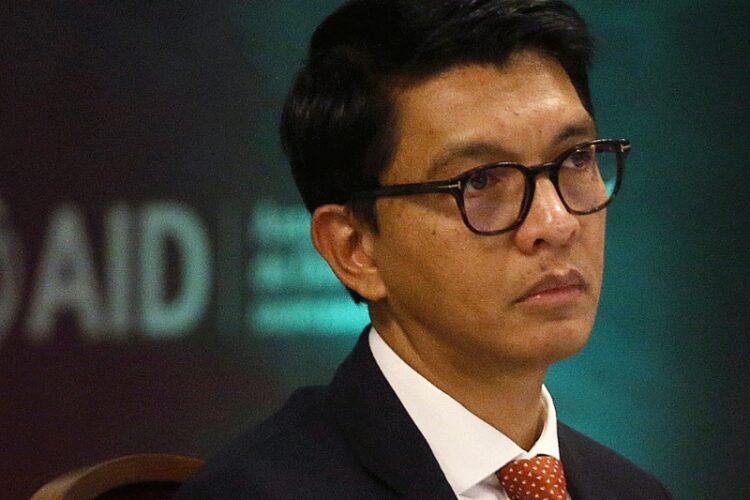By Ben Kerrigan-
The president of Madagascar’s chief of staff and an “associate” have been charged with bribery offences in Britain following a “fast-paced” police investigation, the UK’s National Crime Agency (NCA) said Monday.
Romy Andrianarisoa, 46,(pictured) the top aide to Madagascan President Andry Rajoelina, and Philippe Tabuteau, 54, are accused of seeking a bribe from a British mining company to secure licences to operate in Madagascar.
The pair were remanded in custody on Saturday after they were arrested Thursday in central London “at a meeting where they are suspected of having attempted to solicit a bribe”, the NCA said.
“Following a fast-paced investigation into suspected bribery in action, Andrianarisoa and Tabuteau were arrested in the Victoria area of London on Thursday afternoon,” it added.
They are next set to appear in court in south London on September 8.
The NCA, which targets serious and organised crime in Britain and internationally, said its probe began after the mining firm, Gemfields, “raised concerns” with the agency.
Andrianarisoa and Tabuteau, a French national, were seeking around £225,000 ($285,000) in “upfront charges”, as well as a five-percent equity stake in a proposed licence deal on the island nation off the southeastern coast of Africa, it said.
No further details about the alleged offences were provided.
Andy Kelly, head of the NCA’s international corruption unit, praised Gemfields for “bringing this matter to our attention and for their ongoing cooperation with the investigation”.
“Their quick reactions to engage the NCA have been critical to our ability to pursue this case,” he added.
The pair were each charged with one count of requesting, agreeing to receive or accepting a bribe, under Britain’s 2010 Bribery Act.
Gemfields, which mines and markets coloured gemstones, specialises in emeralds mined from Zambia and rubies from Mozambique, according to its website.
The recent news of the President of Madagascar’s chief of staff and an “associate” being charged with bribery offences in Britain has reverberated globally, shedding light on the complex web of international relations, ethics, and accountability. This high-profile case has implications that extend beyond national boundaries, highlighting the challenges of prosecuting corruption across borders and the role of global cooperation in upholding justice.
The Bribery Charges
The charges against Madagascar’s chief of staff and their associate underscore the pervasive and destructive nature of corruption. The allegations, which involve bribery offences, suggest that individuals in positions of power may have sought personal gain at the expense of public welfare. Such actions erode trust in governance and hinder economic development, particularly in countries already grappling with socioeconomic challenges.
This case reflects the importance of upholding the rule of law and holding those in power accountable for their actions, regardless of their geographical location.
Extraterritorial Implications
The fact that bribery charges have been filed in Britain against individuals from Madagascar raises important questions about the extraterritorial reach of anti-corruption efforts. Corruption is a global challenge that transcends borders, and effective prosecution requires international cooperation and collaboration.
Extradition treaties and mutual legal assistance agreements between nations play a pivotal role in ensuring that perpetrators of corruption are not shielded by their home countries. This case serves as a reminder of the necessity of international frameworks that facilitate the pursuit of justice across borders.
The charges against Madagascar’s chief of staff and their associate shine a spotlight on the ethical dimensions of governance. Corruption not only undermines the foundations of democracy but also hampers economic growth, exacerbates inequality, and erodes public trust. It reinforces the importance of establishing transparent and accountable governance structures that prioritize the well-being of citizens over personal gain.
Furthermore, the case highlights the ethical responsibility of governments to collaborate on anti-corruption efforts. It encourages nations to share information, intelligence, and best practices to ensure that corrupt individuals cannot find safe havens to evade accountability.
Global Ramifications
The charges against Madagascar’s chief of staff come at a time when the global community is increasingly focused on combating corruption. International organizations, such as the United Nations and the Organization for Economic Co-operation and Development (OECD), have established frameworks to promote transparency, accountability, and the rule of law. This case adds momentum to the global anti-corruption movement, emphasizing the need for united efforts to curb corrupt practices.
Additionally, it serves as a deterrent to those considering engaging in corrupt activities. As high-profile individuals face legal consequences for their actions, it sends a powerful message that corruption will not be tolerated and that the international community is committed to upholding justice.
Strengthening Global Cooperation
The charges against Madagascar’s chief of staff underscore the importance of fostering global cooperation to combat corruption effectively. Corruption often involves complex networks that transcend national borders, necessitating collaborative efforts among governments, international organizations, and civil society.
Countries must prioritize the establishment of effective mechanisms for sharing information, extradition, and mutual legal assistance. This case serves as a reminder that effective prosecution requires a unified front against corruption, transcending geopolitical differences.
The news of Madagascar’s chief of staff and an “associate” facing bribery charges in Britain illuminates the intricacies and challenges of prosecuting corruption in an interconnected world. This high-profile case highlights the need for international cooperation to hold individuals accountable for their actions, regardless of their positions of power or the countries they represent.
The implications of this case extend beyond Madagascar and Britain. they resonate across continents, emphasizing the collective responsibility to combat corruption and promote transparency.
.




